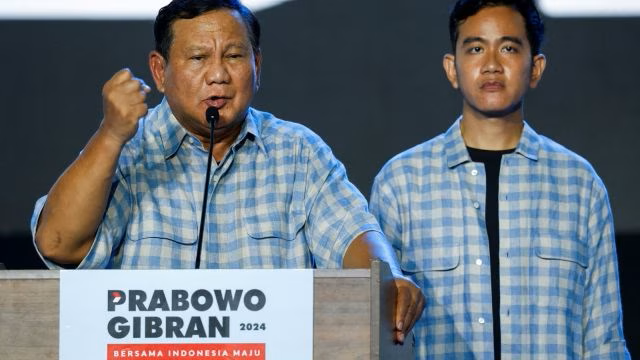What India can expect from Indonesia’s new government
- March 21, 2024
- Posted by: admin
- Categories: India, Indonesia

It does not expect Indonesia to align itself with its view of China. But in trade and commerce, New Delhi expects more from its largest ASEAN trading partner
Written by Gurjit Singh
Indonesia will have a new president after the continuity of a decade under President Jokowi Widodo. Quick count results across the board award the election to Defence Minister Prabowo Subianto and his running mate Gibran Rakabuming Raka. The new President will assume power in October 2024 with formal results declared by March 20.
Prabowo-Gibran secured a massive mandate and overcame the challenge from a former education minister in Jokowi’s first administration, Anies Baswedan. The ruling PDIP (Ganjar Pranowo-Mahfud MD) came third and last securing less than 20 per cent while Anies obtained about 25 per cent of the votes. The winner needs 50 per cent, which Prabowo seems to have obtained without a runoff election, which would have been necessary in July.Also Read | As India prepares to take over the G20 presidency, it can learn from Indonesia
The election also covered Parliament, regional governments and legislatures. These results await formal announcement since quick results are more difficult to predict. But quick results have been broadly correct over the last decade and hence the Prabowo victory with a clear 50 per cent-plus seems evidentADVERTISEMENT


The new administration in Indonesia would certainly have its hands full in implementing its domestic agenda and coping with its immediate foreign policy preferences. Indonesia is also now liberated from the chairmanship of major organisations, having chaired the G20 in 2022 and ASEAN in 2023. Its ASEAN presidency will not return till 2033 — perhaps beyond the term of the new administration.Also Read | ASEAN’s China dilemma
While much has been written about what to expect from the new administration and how it came to be, from India’s point of view, it is pertinent to ask what India expects from the new administration. Traditionally, India and Indonesia have differed on how they viewed China, how they saw the Indo-Pacific and their varying views on the Regional Comprehensive Economic Partnership (RCEP) and the ASEAN-India Free Trade Area. India would expect that as a part of Indonesia’s growing strategic autonomy, Indonesia would show greater empathy with India, the Global South and their issues and work closely with India towards this achievement.
In the Jokowi period, China had near total control over economic cooperation with Indonesia, and often shut out other partners. Prabowo could be expected to open up space for other partners without nudging China away, which is a Jokowi legacy. As the Defence Minister, Prabowo had a record of working more closely with the US, France and India, in trying to enhance Indonesian defence capabilities. It is India’s expectation that in a similar sense, Indonesian strategic autonomy will be more open to engage India and the Global South in substantive terms.
India does not expect Indonesia to align itself with its view of China. Indonesia is less threatened by Chinese action in the Natuna sea than India is across the Line of Actual Control. Indonesian economic engagement with China is vast compared to India and therefore, the situations are not analogous. What India can expect is that in strategic terms, Indonesia would engage more with India, perhaps through trilateral arrangements with Quad partners like Japan and Australia.ADVERTISEMENT
Also Read | C Raja Mohan writes: The rise of ‘intelligence diplomacy’ in a time of global security challenges
The Indo-Pacific has ceased to be a source of disharmony between India and Indonesia. With the Indonesian-led ASEAN Outlook on the Indo Pacific (AOIP) enunciated in 2019 and the subsequent agreement on AOIP-Indo Pacific Oceans Initiative (IPOI) cooperation, there is greater coherence. Under this rubric, functional cooperation in the Indo-Pacific can expand, including substantial projects under the maritime resource pillar that Indonesia has chosen to associate with under the IPOI.
In trade and commerce, India has more expectations from India’s largest ASEAN trading partner. Indonesia is a major supplier of coal and palm oil to India. It has traditionally run a large trade surplus with India. However, it lags behind ASEAN colleagues in providing access to Indian goods and services of interest to New Delhi. Given its rising economic stature, India expects Indonesia to be more responsive to Indian imports and investment and encourage its own major industries to look at India for FDI. For two big economies in the region, the level of cross-FDI and trade is actually very restricted.Must Read Opinions
- With looming TikTok ban in the US, the death of the global internet
- Dear Editor, I Disagree: Disability inclusion must move beyond tokenism
- The problem is not difference of opinion. It’s poverty of thought
Indonesia, despite being a neighbour, often looks askance at Indian initiatives. It would do well to join the International Solar Alliance, the Coalition for Disaster Resilient Infrastructure and the Global Biofuels Alliance. It can benefit from these initiatives and its contributions will be important. The gap between stated partnership and real collaboration needs bridging by the new administration.
The writer is former ambassador to Germany, Indonesia & ASEAN, Ethiopia and the African Union
